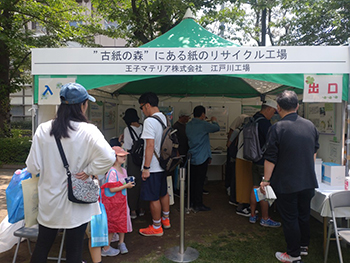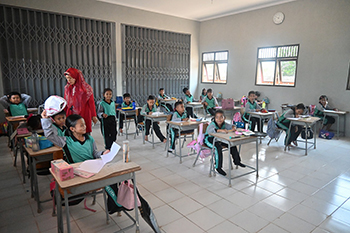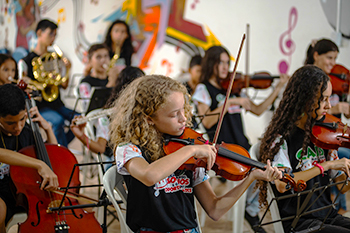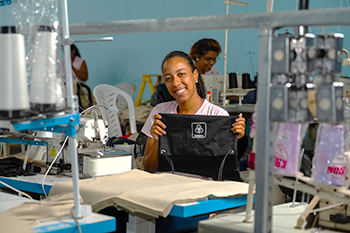Community contribution
At each mill of the Oji Group in Japan, we engage in various activities to harmoniously coexist with the local communities.
Oji Paper Tomakomai Mill holds tree-planting ceremonies at a company-owned forest in Tomakomai. We started holding this ceremony more than 70 years ago. In FY2024, we held the 73rd tree-planting ceremony on May 22.
Healthy forests contribute to marine ecosystems by supplying nitrogen, phosphorus and other nutrient salts to the ocean via rivers, and these marine ecosystems support fishery resources. Rooted in this idea that forests are responsible for the growth of fish, the Tomakomai Federation of Fisheries Cooperative Associations began to participate in the ceremony in 1995 as part of its Osakana Fuyasu Shokuju Undo (tree-planting activities for increasing fish). Thus, this tree-planting ceremony contributes to ensuring rich fisheries resources in the Tomakomai City area, which are represented by the surf clam, while at the same time helping increase wood resources.

In 2023, we began to hold the Oji Matsuri festival in the open space in front of the mill. It is held as a two-day event in August. This festival attracts a large number of people including employees working at the mill, their families, people from Group companies and local residents.

At the same time as the 2024 Chitose-Lake Shikotsu Ice Festival, we opened the Chitose No. 1 Hydroelectric Power Plant to the public for a special night event called the Environmentally Friendly Light Display at the Chitose No. 1 Hydroelectric Power Plant. The hydraulic power plant supplied electricity to illuminate not only the plant itself but the entire Ice Festival.

At the Oji Paper Kasugai Mill, we clean up rivers near the mill in the spring and autumn in cooperation with local neighborhood associations, citizen's groups and the government. We are committed to making it a partnership activity involving local resident, the government and the company.

At the Oji Paper Yonago Mill, we clean up a beach near the mill two times a year and collect and segregate debris that washes up on the beach.
Established in 1986, Yonago Gaina Mando was modeled after the Akita Kanto lantern parade, as part of initiatives to establish new local performing arts for the Yonago Gaina Festival, which is hosted by the Yonago city government. Since then, the parade has been an established feature of summer. People from approx. 40 groups including local enterprises and children's associations carry mando, adding color to the summer sky.
Mando are assembled from bamboo poles carrying 46 lanterns, which are lit up with candles. They are eight meters long and weigh approx. 40 kilograms. Up to five bamboo poles called tsugitake are attached to the mando, making them 13 meters high. Performers carry the mando on their palms, chins, foreheads, shoulders and lower back, competing in terms of pole stability. Further, skilled performers descend to their knees or open fans or umbrellas while carrying the mando. The mando held up high to the sky and the lithe and powerful tricks of the dancers brightly illuminate the night sky, exciting the crowd, who are exploded with excitement.
Oji Paper's mando team began to participate in the festival in 1986, the year the Yonago Gaina Mando was established. Employees that are members of the team increase their unity by participating in local activities through their mando activities. They make concerted efforts to perform well in front of audiences.


Gaina Mando Parade
Every year, we participate in the mass cleanup of Aburatsu Port, which is hosted by the Nichinan city government.

Located on the coast of the Seto Inland Sea, Oji Materia's Kure Mill operates every day benefitting from the sea in many ways, including in its raw materials reception and product shipment. To express our gratitude for the sea, we participate in an activity to clean up the sea jointly with the local fisheries cooperative, which organizes the event on Marine Day every July. We collect, segregate, and cut driftwood and garbage to clean up the port.

A mutual understanding between the forest plantation business and the local community and the sharing of environmental, social and economic benefits are indispensable in our sustainable forest management. The following are examples of our initiatives for these purposes.
Working closely with local governments, CENIBRA supports and implements projects to create jobs and improve people’s income in its operational areas.
In collaboration with beekeeping associations, CENIBRA promotes the establishment of beehouses in permanent preservation areas and near plantation sites. This initiative balances environmental conservation with job creation, providing beekeepers and their families with sustainable income.

CENIBRA partners with municipalities and agricultural unions to support small-scale farmers by providing technical guidance and free access to arable land. Currently, around 390 families in six municipalities cultivate vegetables and corn on approximately 290 hectares of land. Part of the harvest is donated to welfare organizations, while the initiative also fosters rural employment and stabilizes local populations.

CENIBRA supports artisans who use Indaiá palm leaves, a plant native to eucalyptus plantations, to create traditional crafts. Partnering with cultural associations and universities, the company assists in sustainable resource management and product diversification. These crafts can now be purchased globally online, helping artisans increase their income while preserving and elevating their cultural heritage.

Education
The Oji Group manages 635,000 hectares of forests, consisting of 188,000 hectares in Japan and 447,000 hectares across overseas countries.
Since 2004, the Group has been holding the Oji Forest Nature School, a nature experience environmental education program for school children in the fourth, fifth and sixth grades, as one of its initiatives leveraging the Oji Forests.
In 2024, the event was held for the 19th time online from Monday, August 5 to Wednesday, August 7, to enable children from a wider area to participate. We prepared two programs related to forest and paper, and 214 children from across Japan participated in these programs over the three days.
In the first program, Forest Recycling, the children learned about the forest cycle created by forest plantation and multiple functions of forests while reliving their memories of forests and experiencing their connection to trees during a workshop. This was the first part of the program. In the second part, they made key chains using lumber from forest thinning. In the first part of the second program, Paper Recycling, the children learned about the process of recycling recovered paper and the importance of waste segregation using quizzes. In the second part, they made postcards using special papermaking kits.
This year, we valued enabling children to understand the scale of Oji Forests and our papermaking activities. We did this by using true-to-life photographs of our paper mills and company-owned forests. We also emphasized communicating with the children. After the programs, we conducted a questionnaire survey of their guardians. The comments of the guardians included the following:
It encouraged their interest in forests, paper and nature and think about how they are connected to their own lives.
They enjoyed participating in the event through the experience of stating their opinions in front of others and making something with their own hands.
I learned about the educational and environmental initiatives of Oji Holdings, which changed my impression of the company.
The Oji Forest Nature School is an important opportunity to share our position and thinking on environmental preservation with children, who will be major players in the future.



For more information, please see the following website.
At the Oji Group, we use recovered paper for many paper products, with the utilization ratio of 68.3%.
Foreign matter that is not paper and paper that has been converted in a way that is not appropriate for recycling are specified prohibited materials because they cause quality problems when recycling recovered paper. It is therefore important to prevent these materials from being mixed into the recovered paper to improve its quality. The Oji Group collaborates with wastepaper wholesalers and the Paper Recycling Promotion Center to increase schools, local governments and companies' awareness of the importance of preventing the mixing of prohibited materials and recovered paper.
The Paper Recycling Promotion Center visits schools to teach classes. We lectured during one of the classes on November 20, 2024. In the class, 93 fourth-grade children learned about paper recycling by experiencing papermaking.

Oji Nepia collaborates with Japan Toilet Labo in the teaching of the Poo Class at elementary schools to enable children to have fun learning about defecation.
It was launched with Japan Toilet Labo in 2007 as a unique Oji Nepia initiative. As a company providing toilet rolls, Oji Nepia wanted to enable children to learn about defecation, an important action that is essential for life. In this class, the Poo Prince visits elementary schools and tells the children about the importance of toilets using an original textbook. The class is themed on poop and health, toilet hygiene and etiquette, and how toilet rolls are made.

Oji Materia's Edogawa Mill co-sponsors and exhibits at the Edogawa-ku Kankyo Fair, an environmental fair held in Edogawa Ward, Tokyo, to provide today's children with opportunities to think about the environment. In 2024, this event was held on June 2, and the Oji Materia booth attracted about 400 visitors of the approx. 30,000 people that came to the fair.
Additionally, Oji Saito Paper Recycle Co., Ltd. exhibited at the Eco Life Fair in Nanma, which was held in Kanuma City, Tochigi on November 2, 2024. The purpose of this event was to raise awareness of environmental problems and the mottai nai concept to preserve the safe environment which provides abundant gifts and value people and things. Another goal of the event was to encourage participants to engage in practical activities. We provided visitors with various information about paper-related topics, including environmental conservation through recycling.

Since 2008, KTH has been operating an elementary school and kindergarten in its forest business areas. To support students commuting to these schools from other villages and attending middle and high schools in neighboring towns, we also provide a school bus service.
In 2023, we renovated and expanded the aging elementary school building. To celebrate its completion, we held an unveiling ceremony inviting the local village chief, parents, and representatives from the board of education.
Additionally, from 2023 to 2024, we upgraded the school buses, ensuring a more comfortable and reliable commute for the children.


CENIBRA actively supports educational programs for children and young people in its forest project regions. One notable initiative teaches participants how to craft and play musical instruments. The instruments are made using eucalyptus wood donated by CENIBRA. This is an example of using renewable forest resources to benefit society.

CENIBRA operates UNIECO, an integrated corporate and community support unit addressing cultural and social challenges in the region. UNIECO provides free programs to promote civic awareness, environmental education, reading and learning opportunities using digital technologies. These initiatives enhance community development and strengthen bonds within the region.

CENIBRA supports residents’ skill development and vocational training complemented by donations of essential equipment for these activities.

Healthcare
With 440 beds (including eight ICU beds) and 28 departments, Oji General Hospital provides highly functional, high-quality medical services as the base hospital in the East Iburi-Hidaka medical district. It is a designated disaster key hospital, regional cancer treatment hospital, and regional perinatal medical center. It also teaches and develops trainee doctors as a hospital designated for clinical training.
Oji General Hospital also has Care Life Oji, which is a health care facility for the elderly requiring long-term care, as well as Oji In-Home Long-Term Care Support Center and a community general support center that it operates on commission from the city government of Tomakomai. It is thus dedicated to providing safe, reliable medical services.

Since 2001, CENIBRA has been conducting health promotion activities, including lectures on wellness, social care and preventive healthcare. These efforts aim to increase residents’ health awareness.

The Hawke’s Bay Rescue Helicopter Trust is a registered charity that provides essential rescue helicopter services in the Hawke’s Bay region. Their services include on-site emergency medical support at accident scenes and the inter-hospital transfer of critically ill or injured patients.
The Trust played a vital role in life-saving efforts during the devastating Cyclone Gabrielle in 2023, which caused significant damage in the region.
Operating 24/7, the rescue helicopter service is available free of charge to everyone in the local community. Funding for the Trust comes from local corporate sponsors, donations, and government subsidies. Pan Pac has proudly supported the Trust’s mission as a sponsor since 2001, helping to ensure this critical service continues to be provided.

From 2012 to 2020, QPFL in Vietnam dispatched medical teams to remote villages without access to healthcare. These teams provided consultations, distributed medications as needed, and delivered medical care to approximately 7,000 residents over the years. Their services, included general check-ups, blood pressure monitoring, dental exams, ultrasounds and prenatal care, primarily benefiting children, pregnant women and the elderly. Alongside these visits, the team also distributed donated clothing, which was warmly received by the villagers. (Due to the COVID-19 pandemic, the dispatch of medical teams was paused in 2021 but is planned to resume in response to future village requests.)
In response to villagers' needs, QPFL also supplied 61 medical devices to the village health center in 2020, including blood pressure monitors and thermometers. Further extending its support, the company helped build a storage facility for medical equipment and pharmaceuticals at the health center in 2024.


Recycling of disposable chopsticks
The Oji Group collects and recycles used disposable chopsticks with the spirit of valuing environmental protection and resources—that is, improving the environment of daily life through cooperation between residents, businesses, governments and schools. Note: We resumed the collection of used disposable chopsticks in July 2024.
Used disposable chopsticks are recycled into a raw material used for paper.
Make sure that the following are not mixed in with the disposable chopsticks that you collect.
| Oji Paper Co., Ltd. | Oji Paper Tomakomai Mill | 2-1-1 Oji-cho, Tomakomai-shi, Hokkaido, 053-8711 Tel: 0144-32-0111 |
|---|---|---|
| Kasugai Mill | 1, Oji-cho, Kasugai-shi, Aichi, 486-0834 Tel: 0568-81-1111 |
|
| Nichinan Mill | 1850 Oaza Todaka, Nichinan-shi, Miyazaki, 887-0031 Tel: 0987-23-2181 |
10 kg (approx. 2,500 pairs of chopsticks) --> 15 boxes of tissue paper
3 pairs of chopsticks (6 chopsticks) --> One postcard or one sheet of A4-sized copy paper
Corporate Sustainability Department, Oji Holdings Corporation
4-7-5, Ginza, Chuo-ku, Tokyo, 104-0061 Japan
Tel: +81-3-3563-7020
Fax: +81-3-3563-1139